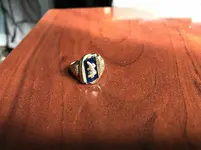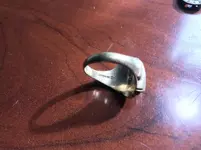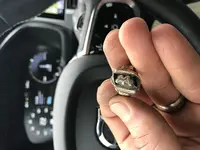I actually have done some extensive testing with disc and notch in the field. Using both at the same time is not good for my machine, but I have tested them individually. What I have come up with (and you can try this if you want) is that disc only sets the limits of ferrous(iron). Notching does something else and I don’t get as good of a signal for some reason. I have no ill affects on depth with high disc setting. If the conductivity of the target is above the disc setting then the Deus will see it even at depth. Notching for some reason messes up the signal even for targets with a conductivity above the notch setting. Almost every target’s conductivity rises as it gets deeper, so notching the high conductivities is also going to kill deep targets.
I only like the high disc setting in modern trash infestation. I like the 57 conductivity setting because it gets nickels and most gold but sets lower conductive targets (trash) to sound off like iron. I set the iron vol to at least 1 all the time.
First of all, finds don't lie and that was an awesome find and I am not here to take anything away from a great save, just seeking to learn and be a better detectorist with my equipment so bare with me. At 66-67 it was a borderline mid to high conductive target (due to composition and bulk metal it was leaning to the high conductor side vs. higher purity gold jewelry). Even with cranked disc, 5" is not unreasonable depth and 14 khz was probably a good frequency for that particular target, so I am not surprised it rang up even with high disc. I think the depth loss effect is more pronounced on high conductive silver (90's or higher).
But I am really scratching my head here on what you are saying about your testing because it just throws everything out the window on what I
thought I knew about disc and notch on the Deus.
Specifically, notching shouldn't affect the signal at all because it is just audio and tid suppression AFTER target filtering (by disc and/or reactivity/silencer). Disc typically affects iron and then non-ferrous target depth as you increase it above the iron range (typically tid's greater than 20) (even non-ferrous conductors well above the disc setting, i.e., high conductors).
If you are able to hear the "iron" (using iron volume) in the disc range you must be running pitch or multi vice full tones (full tones has no iron volume and completely silences in the disc range) and perhaps the notch is affecting the tone breaks (I couldn't find where you mentioned the type of tone/pitch you were using - multi tone (5, 4, 3, ?), full tones, or pitch). Forgot to ask above, but if you are running multi tones, can you give me the TID tone breaks, too? I want to replicate your settings as much as possible. Also need reactivity and silencer settings.
Calabash just ran a video a few weeks ago with someone who had disc set all the way up to 40 or something like that and you could not get a peep out of his test garden's deep high conductors that would typically ring up well above 40. He has mild soil, so depth was definitely affected.
Not disputing your testing or results (you typically just kill it with some awesome finds at your GA home base, so who am I to argue with success), but your situation appears atypical and runs counter to how the Deus is "supposed" to behave, so I am curious to find out what is going on because I don't want to be spreading bad info. Maybe I am losing my Deus mojo from too much Equinoxing. Lol.
Therefore, I will definitely run some tests on my own with a variety of conductors with your settings and observations in mind and report back on how high disc settings affect depth and how notch affects depth (it shouldn't) in my soil.
You probably posted your results previously on this awhile back, do you have a post reference so I can see what was going on with your testing? Thanks.
It would be good if Calabash and/or Tnsharpsooter would weigh in on this because they are the test garden kings on the Deus. A lot of what I know is based on their test results.
Again, great snag.
HH









